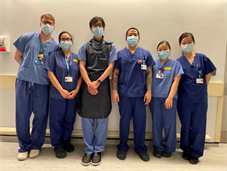First King’s endovascular fistula for dialysis created
27 April 2022 - The Interventional Radiology team at King's College Hospital has created an endovascular arteriovenous fistula for people with chronic kidney disease

The Interventional Radiology (IR) team at King’s College Hospital has created the first minimally invasive endovascular arteriovenous fistula (AVF) for patients who have chronic kidney disease and need haemodialysis.
An endovascular AVF involves fusing an artery and adjacent vein within the forearm using a sub-second burst of radiofrequency energy. Two thin catheters are inserted into the artery and the vein through small needle punctures. Magnets help to align the devices and a connection is made between the vein and artery in the forearm. The novel endovascular AVF procedure results in a closed circuit that provides adequate blood flow to the superficial veins for dialysis access.
Dialysis can also be conducted through a central venous catheter (CVC), a small plastic tube inserted into one of the large veins but is associated with higher risks of infection and high levels of morbidity, causing veins to close.
Dr Dean Huang, Consultant Interventional Radiologist at King’s, submitted an application as part of the renal vascular access multidisciplinary team (MDT) to the New Clinical Procedure Committee (NCPC) for approval, and is pleased that the work is coming to fruition.
“This new treatment really enhances the options we have available in treating our patients with end-stage kidney disease,” Dr Huang said. “Endovascular AVF is an alternative option which avoids surgical scarring and minimises arm disfigurement associated with traditional surgical AVF.
“Avoiding a CVC is imperative, and now we have another procedure available to enable timely AVF creation. This is down to the tremendous teamwork from the entire renal vascular access MDT in setting up this new clinical pathway for our patients.”
One of the main contributing factors in successfully setting up this new service is the excellent multidisciplinary collaboration between renal, vascular surgery, vascular laboratory, anaesthetics and IR.
Dr Jason Wilkins, Clinical Lead for Interventional Radiology, said: “This is a new service for our patients, and it’s thanks to the efforts from renal, access surgeons, vascular laboratory and IR.”
Dr Dean Huang would like to further develop and innovate the IR service at King’s to better serve our patients who have chronic kidney disease and need dialysis. “There are only a finite number options available for vascular access, which is the lifeline for these patients.” Dr Huang said. “Through the multidisciplinary approach, we very much look forward to continuing to contribute to the care of these patients, in line with King’s BOLD vision.”
